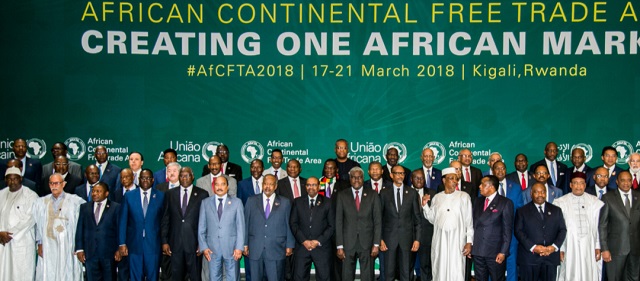Last month, the African Continental Free Trade Area (AfCFTA) finally came into being, opening the way for a continent-wide market of 1.2 billion people worth $2.5 trillion.
Fifty-two of the African Union’s (AU) 55 member states signed the deal, which is expected to boost regional and international trade. It will be the largest free trade agreement by population that the world has seen since the 1995 creation of the World Trade Organization.
The African Continental Free Trade Area (AfCFTA) agreement, has been hailed as a game-changer for intra-African trade.
If properly implemented, it could provide a framework to ease the cost of doing business in Africa, but until the continent addresses nontariff barriers, such as infrastructure backlogs and border corruption, it is likely to fall far short of expectations.
This hasn’t stopped African countries from hyping up the agreement as a significant milestone on the road to creating a single African market and a single-currency union.
Various reports suggest that as a large, unified market of up to 1.2-billion people, the AfCFTA could attract up to $4-trillion in consumer spending and business investment; boost intra-African trade by 33%-52%, depending on the degree of tariff liberalisation; and generate a cumulative $3.4-trillion gain in GDP over the long term.
Intra-African trade is dismal at present, hamstrung by border delays and infrastructural constraints that account for the high logistics costs associated with doing business on the continent. The upshot is that intra-African trade accounts for only about 16% of Africa’s trade with the rest of the world, compared with 25% for Latin America and almost 50% for Asia.
The AfCFTA is supposed to forge a single continental legal regime for trade matters. It should include substantially lower tariffs, simplified rules of origin and customs procedures, and regulations for trade in services, as well as the remedies to use when these trade rules are broken.
However, the enforcement of a rules-based trading regime will depend on effective monitoring as well as African trading partners pursuing dispute settlement cases against one another, something they’ve traditionally shied away from.
SA — with its relatively diversified industrial export base on a continent where most countries still export primary commodities — should be one of the biggest winners from a continent-wide free-trade agreement, if implemented properly.
So should Nigeria, for the same reason. But its government appears concerned that the country’s nascent manufacturing base could be badly affected by competitively priced imports, and is undertaking further impact studies before it signs the agreement.
“With proper implementation, this agreement brings immense investment potential to Africa. By driving down the cost of trading across borders it can boost trade and open new markets on the continent,” says Tim Harris, CEO of Wesgro, the Western Cape government’s investment promotion agency.
“The liberalisation of services trade under the AfCFTA is especially significant, not only because it brings opportunities for [Western] Cape services exports, but also because improvements in, for instance, transport, communications and financial services further facilitate effective cross-border trade and investment,” he adds.
However, though the AfCFTA agreement came into force on May 30 for SA and the other 23 early adopters, there are as yet no tariff schedules, no rules of origin and no rules for specific services sectors to regulate trade between the signatories.
“These are sensitive and technically complicated matters and it may take quite some time before they are finalised,” says Gerhard Erasmus, professor emeritus at the University of Stellenbosch and an associate at the Trade Law Centre.
So though Africa is moving towards a more open way of doing things, and any progress in this direction should be welcomed, the agreement is unlikely to fulfil its ambitions any time soon.
Source: africapropertynews






